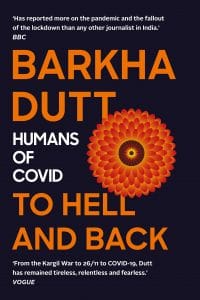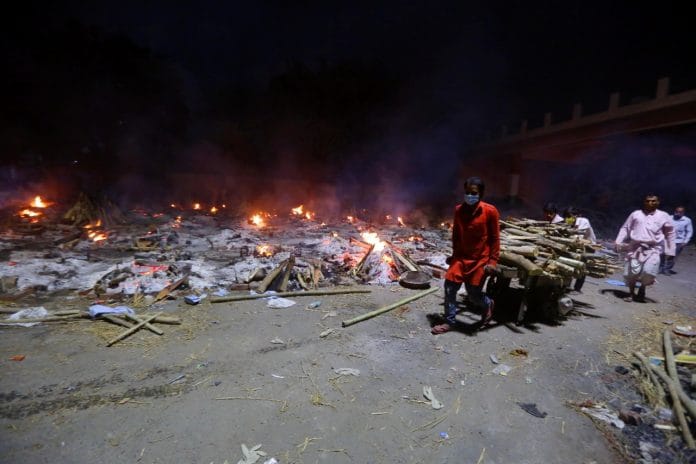Funerals for Lonely Humans
If ever there were four words that captured the emotional deprivation, social isolation and institutional breakdown of the pandemic years, here they were.
The words were scrawled in bright blood-red across the side of a white van that was now a repurposed ambulance, that at a pinch also doubled up as a hearse.
The van was always left in first gear and ready to go. In May 2020, it was parked in the open space in the front side of the one-room office of Ekta Trust, next to a stockpile of wooden logs (firewood for cremations) and right across the street from Surat’s main church.
Abdul Rehman Malbari, a sprightly middle-aged man with a youthful restlessness, was getting ready to jump into the front seat and drive to the civil hospital. The death was of a Hindu woman. From the hospital he would have to drive with the hearse to a cremation site.
His premises were tiny. A bare table and chair were placed in a room that was as narrow as a phone booth. A slightly bigger adjacent room was chock-a-block with ceremonial material haphazardly organized in colourful, untidy piles that rose from floor to ceiling. There were casket sheets and prayer mats for Muslim burials, but also Gangajal and ghee for Hindu cremations. Malbari performed both, making sure to take a photograph of the rituals to share with families later, so relatives could be reassured that those they loved had been sent off with dignity. Countless others were simply left to die, at the gates of graveyards and crematoriums or inside hospital wards.
Malbari, who had set up his small volunteer force after the Gujarat earthquake in 2001, had long made it his mission to provide dignity in death to those who had remained unloved in life. But nothing he had done in the aftermath of limited natural calamities – in peacetime his work was limited to the burial of the body of a beggar or a homeless man who would die unmourned on the streets – had prepared him for this.
With almost no one willing to handle bodies, not even those of their own parents, lovers or siblings, the city’s municipal corporation had tasked Malbari with the job.
Also read: 4th Covid wave could hit India between June & October, IIT-Kanpur preprint says
That he was a Muslim, now immersed in all the Hindu rituals of last rites, right from slokas to sandalwood, did not strike him as the least bit comment-worthy.
‘I am more scared of the living than the dead. The bodies – before they are Hindu or Muslim – they are human.’
At any other time, this would have been a truism, a self-evident do-gooder statement that may have even been overlooked for its obvious good manners.
But Indian public discourse had already been coarsened by a communal, poisonous conversation around the role of the Tablighi Jamaat, an orthodox Sunni sect, as a super-spreader. There were other religious communities that were on pilgrimages when the lockdown was announced by the prime minister – Sikhs at the gurudwara in Nanded in Maharashtra, Hindus at Vaishno Devi in Jammu – but the language used for them in mainstream media was very different.
In India, paradoxically, in a Dickensian besting and worsting of times, the breakdown of social and community structures ran parallel to extraordinary displays of courage and compassion.
And nowhere was this more evident than in the stories of those who stepped up to be the pallbearers of COVID.
It was a job no one else was ready to do.
The COVID pallbearers – Hindu, Muslim, Sikh and Christian – were the handymen tasked to repair and reassemble the broken bits of our humanity. Nearly all were poor or of modest means. Many had spent years at the very bottom of the caste or economic ladder, socially discriminated against, even though it is in their hands that we place the bodies of those who have our hearts. They are the gravediggers, the body washers, the corpse burners and the furnace cleaners, the conduit between the end of this life and whatever lies on the other side.
Also read: 2021 in photos part 2 — Covid pyres burn all day, police of 2 states clash, a deadly ambush
‘The virus does not distinguish between Hindu and Muslim,’ said Jagdish Paswan, a mortuary worker at Indore’s private Aurobindo Medical College. Flanked by Golu, Sohanlal and Lakhan, all Hindus, these were the men who buried the bodies of the Muslim patients who died at the hospital. Dressed in maroon scrubs and masks, they stood with both pride and purpose, like soldiers stationed at the borderline. ‘Families are not ready to touch the bodies, so we do it for them,’ said Jagdish, barely flinching as a corpse wrapped like a mummy from head to toe was wheeled in on a stretcher as we spoke. Fourteen per cent of Indore’s population is Muslim, but as Golu asked me: ‘What does religion have to do with anything, isn’t this about humanity?’ His words provoked a spontaneous applause from those who were listening to our conversation – security guards, sweepers, technical staff. What may have sounded like homilies and platitudes in peacetime had acquired an urgent moral force in a mass-media-generated environment of hate.
At the Jadeed Qabristan, a haven of quiet tucked away behind the traffic snarls of ITO in Delhi, one of the busiest road junctions in the world, Mohammed Shamim was forced to pull at gravel and stones with his bare hands after the men who steered the bulldozers and drove the heavy JCB excavators refused to show up at work. In its ninety-seven-year history, this sprawling, leafy haven of stillness had never run short of space. But now Shamim, a towering, tall man who was lean as a twig and wore a baseball cap over his long kurta and short pyjamas, had to cut through brambles and bushes to clear more space for graves. Walking through what was ‘once a jungle’, he pointed to his clothes, the rough and tumble, mismatched cottons on his skin.
‘We touch the bodies that no one else is willing to keep. But our PPE kits have run out. We have no gloves, no protective gear.’ The twenty kits given to him by the local municipal authorities right at the beginning of the pandemic had been used, reused (though strictly not meant to be) and thrown away. ‘But I still have to do this job. If I don’t, who will?’ Between March and June of 2020, Shamim buried 240 bodies himself, both COVID and suspected COVID. He finally found one man, Sher Singh, who agreed to operate the JCB machine. Shamim motioned in the direction of a sunny yellow truck that stood in the distance, its jaw buckets and arms lined with fresh blobs of soil. ‘Sheru,’ he called out, in convivial familiarity, ‘come here for a second.’
Sheru came sprinting towards us, a short, sprightly man who was no taller than Shamim’s shoulder. He was wearing a tomato-red Carlsberg T-shirt, hand-me-down black trackpants and a big smile. Of all the machine operators Shamim had reached out to, only Sheru, a Hindu, had agreed to take on the job of running the hydraulic machine through the rocks and stones to make way for the bodies of Muslims who were dying from COVID. ‘It’s pagalpan,’ Sheru said, ‘to do Hindu-Muslim politics in the middle of a pandemic. Shamim and I – we are brothers.’
Also read: This Padma Shri awardee could not bury his dead son. It broke his heart & gave him a mission
Varanasi’s ghats, where believers bring their dead in search of salvation, even have their own raja. The ‘king’ of the Dom community is the leader of the Dalit sub-caste that has historically been the keeper of the sacred flame – the pyres are lit with this flame and never a matchstick – at the Raja Harishchandra and Manikarnika funeral grounds by the Ganga. In 2019, this ‘chief cremator’ was one of the four nominees who proposed the name of Narendra Modi as candidate from the constituency in 2014. But the Doms, much sought after in moments of bereavement, are still reviled by the living. Barred from temples and weddings, they have lived a life of continued social exclusion despite the occasional media spotlight.
Over two consecutive summers, as space shrank at the riverbanks and bodies stacked up like a macabre mountain of pending laundry, cremation grounds became battlefields. There was jostling for space, shouting over the exorbitant cost of wood and continuing uncertainty and fear over whether it was safe to be proximate to the bodies of those who had died.
The job of preparing the bodies for the last rites was that of the body washers of Varanasi. They said they were in their early twenties, but some of them were clearly still teenagers. They received the bodies at small, ramshackle outposts before they were taken to the pyres for burning.
We made our way past stockpiles of wooden logs spilling on to the narrow road that led to the pyres. ‘In Hindu dharma, the most important thing when someone dies is to give the arthi a kandha,’ Deepak said, talking of the traditional shoulder offered to the deceased before the flames consume the body, conventionally the duty of the men in the family. ‘Families aren’t ready to touch the people they claim to love; we do it, and they still judge us, vilify us. What we are doing is public service.’
 This excerpt from ‘To Hell and Back: Humans of Covid” by Barkha Dutt has been published with permission from Juggernaut Books.
This excerpt from ‘To Hell and Back: Humans of Covid” by Barkha Dutt has been published with permission from Juggernaut Books.






